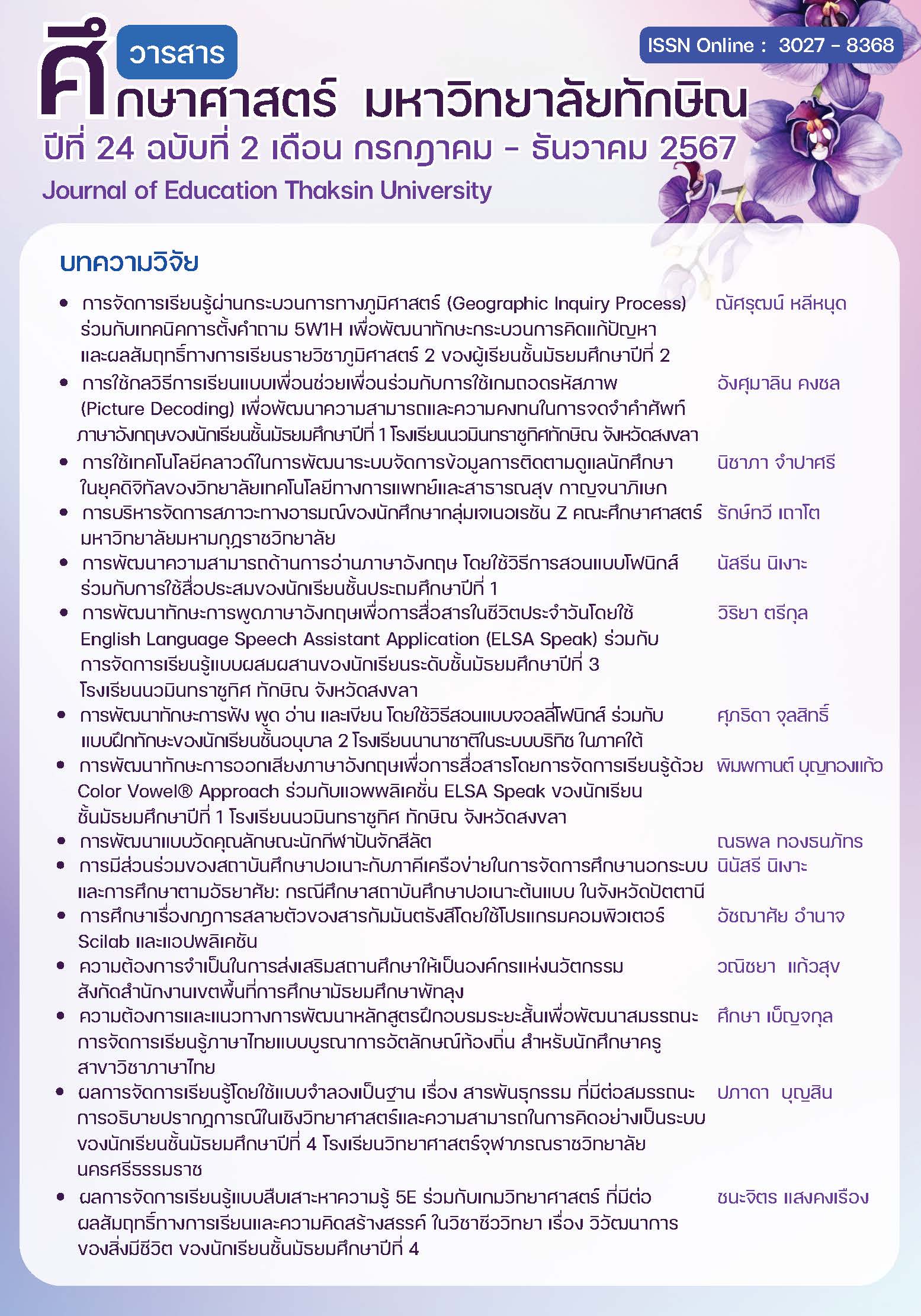การบริหารจัดการสภาวะทางอารมณ์ของนักศึกษากลุ่มเจเนอเรชัน Z คณะศึกษาศาสตร์ มหาวิทยาลัยมหามกุฏราชวิทยาลัย
Main Article Content
บทคัดย่อ
การศึกษาวิจัยครั้งนี้ มีวัตถุประสงค์ 1) เพื่อจัดกลุ่มสภาวะทางอารมณ์ของกลุ่มนักศึกษาเจเนอเรชัน Z คณะศึกษาศาสตร์ มหาวิทยาลัยมหามกุฏราชวิทยาลัย และ 2) เพื่อศึกษาแนวทางในการบริหารจัดการสภาวะทางอารมณ์ของกลุ่มนักศึกษาเจเนอเรชัน Z คณะศึกษาศาสตร์ มหาวิทยาลัยมหามกุฏราชวิทยา กลุ่มตัวอย่างที่ใช้ในการวิจัยครั้งนี้ นักศึกษาระดับปริญญาตรี คณะศึกษาศาสตร์ มหาวิทยาลัยมหามกุฏราชวิทยาลัย ที่กำลังศึกษาประจำปีการศึกษา 2566 จำนวน 62 คน ได้มาจากการสุ่มแบบหลายขั้นตอน (Multi – Stage Random Sampling) เครื่องมือที่ใช้ในการวิจัยครั้งนี้เป็นแบบสอบถาม คำถามปลายเปิด การวิเคราะห์ข้อมูล ได้แก่ ค่าความถี่ ร้อยละ ผลการวิจัยพบว่า
1) ผลการจัดกลุ่มสภาวะทางอารมณ์ของกลุ่มนักศึกษาเจเนอเรชัน Z ได้แก่ 1.1) กลุ่มที่มีความกดดันหรือแรงกระตุ้นต่อสุขภาวะจิต 1.2) กลุ่มเมื่อต้องเผชิญกับสถานการณ์ที่ทำให้โกรธหรือเสียใจบ่อย ๆ รู้สึกอับอายและเครียด รู้สึกอิจฉาหรือเดือดร้อน 1.3) กลุ่มเมื่อตกอยู่ในสถานการณ์ที่ทำให้โกรธหรือเสียใจบ่อย ๆ รู้สึกอับอายและเครียด รู้สึกอิจฉาหรือเดือดร้อน และ 1.4) กลุ่มเมื่อต้องเผชิญกับสถานการณ์ที่ท้าทาย
2) แนวทางในการบริหารจัดการสภาวะทางอารมณ์ของนักศึกษากลุ่มเจเนอเรชัน Z โดยกระบวนการการตระหนักรู้อารมณ์ (Emotional Awareness) การควบคุมอารมณ์ (Emotional Regulation) และการใช้กิจกรรมจัดการอารมณ์ (Activity for Emotional Management) เพื่อสุขภาพจิตใจ การใช้เทคนิคการหายใจ การให้เวลาให้กับตัวเอง และการพิจารณาอารมณ์เป็นต้นเป็นวิธีที่ช่วยให้ตนเองควบคุมอารมณ์ของตัวเองได้อย่างมีประสิทธิภาพและมีผลต่อความสำเร็จในชีวิตประจำวันของตนเอง
Article Details

อนุญาตภายใต้เงื่อนไข Creative Commons Attribution-NonCommercial-NoDerivatives 4.0 International License.
ในกรณีที่กองบรรณาธิการ หรือผู้เชี่ยวชาญ ซึ่งได้รับเชิญให้เป็นผู้ตรวจบทความวิจัย หรือ บทความทางวิชาการมีความเห็นว่าควรแก้ไขความบกพร่อง ทางกองบรรณาธิการจะส่งต้นฉบับให้ ผู้เขียนพิจารณาจัดการแก้ไขให้เหมาะสมก่อนที่จะลงพิมพ์ ทั้งนี้ กองบรรณาธิการจะยึดถือความคิด เห็นของผู้เชี่ยวชาญเป็นเกณฑ์
เอกสารอ้างอิง
กนกวรรณ เรื่อสีจันทร์. (2563). การเสริมสร้างการควบคุมความโกรธของนักเรียนวัยรุ่นโดยการให้คำปรึกษากลุ่ม. (การศึกษามหาบัณฑิต). กรุงเทพมหานคร : มหาวิทยาลัยศรีนครินทรวิโรฒ.
กรมสุขภาพจิต. (2545). คู่มือความฉลาดทางอารมณ์. นนทบุรี: ศูนย์สารนิเทศและประชาสัมพันธ์กรมสุขภาพจิต. กรมสุขภาพจิต. (2564). บทความด้านสุขภาพจิต Gen Y/Gen Me กล่มผู้กูมชะตาโลก. กรุงเทพฯ : โรงพิมพ์ชุมนุมสหกรณ์การเกษตรแห่งประเทศไทย.
จิราภรณ์ อรุณากูร. (2560). ความก้าวร้าวของเด็กที่ผู้ปกครองไม่ควรมองข้าม. Retrieved เข้าถึงได้จาก: https://med.mahidol.ac.th/ramachannel/home/article/ 25 มีนาคม 2567.
ปิ่นประไพ โชติชัชวาลกุล. (2564). การศึกษาสภาพการจัดการอารมณ์ของนักเรียนระดับประถมศึกษา : กรณีศึกษาโรงเรียนนานาชาติ. (ปริญญาการจัดการมหาบัณฑิต). กรุงเทพมหานคร : จุฬาลงกรณ์มหาวิทยาลัย
ผกาวดี ก้อนคำดี. (2565). ทัศนคติของคนกลุ่มเจเนอเรชัน Z ต่อการประสบความสำเร็จ. (ปริญญาการจัดการมหาบัณฑิต). นครปฐม : มหาวิทยาลัยมหิดล.
สุภารัตน์ พัฒนแหวว (2563). การเสริมสร้างการเรียนรู้ทางอารมณ์และสังคมของนักเรียนมัธยมศึกษาตอนต้น โดยการให้คำปรึกษากลุ่ม. (การศึกษามหาบัณฑิต). กรุงเทพมหานคร : มหาวิทยาลัยศรีนครินทรวิโรฒ.
สำนักความร่วมมือการคา้และการลงทุน กรมการค้าต่างประเทศ. (2551). “ยุทธศาสตร์ของภูมิภาคอาเซียน (ASEAN Hub).” บทความกระทรวงพาณิชย์.
Brackett, M. A., Rivers, S. E., & Mayer, J. D. (2020). Anger and frustration management in Generation Z. Journal of Youth and Adolescence, 49(6), 1234-1250. https://doi.org/10.1007/s10964-020-01236-x
Bar-On, Reuven., and James Parker D.A. The Handbook of Emotional Intelligence.San Francisco: Jossey – Bass.2000, 108.
Zhang, L., Wang, X., & Li, J. (2022). Generation Z's responses to unpleasant emotional experiences: The role of social media. Computers in Human Behavior, 127, 107024. https://doi.org/10.1016/j.chb.2021.107024
Gardner, Howard. (1983). Frames of Mind: The Theory of Multiple Intelligences. New York: Basic Books. Goleman Daniel. (1998). Working with emotional intelligence. New York: Bantam Books.
WorkpointTODAY. (2564). เจาะพฤติกรรมคน Gen Z ที่มักถูกเข้าใจผิด พร้อมกลยุทธ์มัดใจ พิชิตยอดขายให้แบรนด์. สืบค้น 2 เมษายน 2565, จาก https://workpointtoday.com/gen-zbehavior/
World Health Organization. (1997). Life Skills Education for children and adolescents in schools. Programmed on Mental Health, 1-3.
Williams, J.M., & Thompson, R.A. (2021). Emotion dysregulation and coping strategies in unpleasant situations among Generation Z youth. University of Minnesota.USA.


